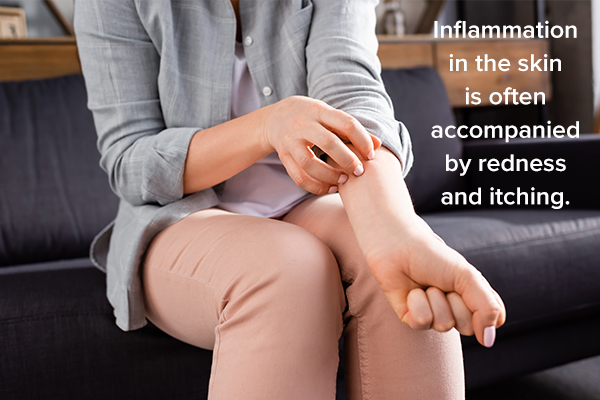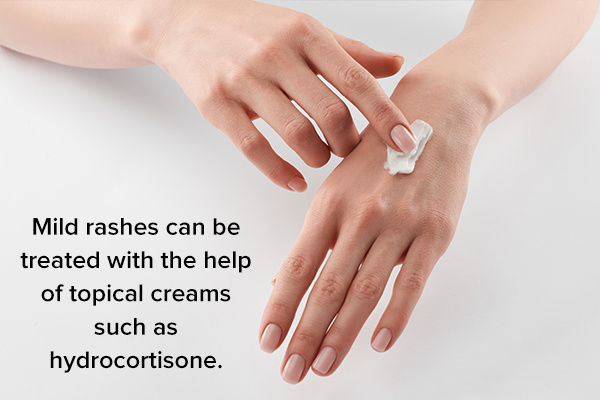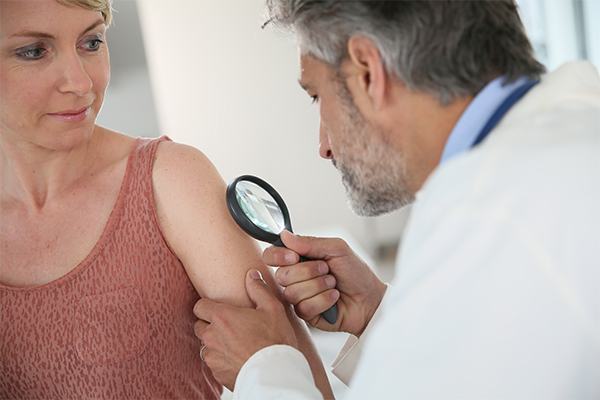In this article:
A skin rash refers to irritation and swelling on a localized area or with a generalized pattern on the skin, often caused by an underlying condition such as allergies. The symptoms may develop immediately after contact with an irritating substance or can even appear days later.

Most rashes clear up on their own in a few days, but some may persist. Rashes that persist usually have an underlying medical cause and can manifest other symptoms as well, for which it is advisable to consult a physician or dermatologist.
Causes of Skin Rashes
Skin rashes are a common symptom among various medical problems, such as the following:
1. Autoimmune disorders
Autoimmune diseases are characterized by immune cells attacking the body’s own cells and organs. As the skin is the largest organ, various autoimmune disorders can cause a skin rash, such as: (1)
- Pemphigoid
- Lupus
- Kawasaki disease
- Sarcoidosis
- Cellulitis
- Scleroderma
- Dermatomyositis
- Vasculitis
2. Inflammatory disorders or conditions

Inflammation in the skin is often accompanied by redness and itching. This may result from a tendency to develop inflammation due to:
- Allergens
- Extreme temperatures (2)
- Stress (3)
- Hay fever
- Eczema
- Contact dermatitis
- Stasis dermatitis
- Irritants such as soap, shampoo, plants, and milk
- Insect bites
- Diaper rashes
3. Infections
Skin rashes can also appear due to bacterial infections, such as those caused by Staphylococcus aureus (4) and Streptococcus pyroxenes, or viral and parasitic infections. (5)
Common skin infections characterized by rashes are:
- Fifth disease
- Chickenpox
- Impetigo
- Measles
- Candidiasis
- Ringworm
- Shingles
- Scarlet fever
- Mononucleosis
- Mountain tick fever
- Lyme disease
- Jock itch
- Rheumatic fever
- Athlete’s foot
4. Genetic conditions
Some people may develop skin rashes due to hereditary diseases or allergies caused by a genetic mutation. (6) These conditions include:
- Ichthyosis vulgaris
- Eczema (7)
- Porphyria
5. Reactions to medications
Certain drugs may cause the development of skin rashes due to a reaction to an ingredient of a drug, allergies, or side effects such as photosensitivity. (8) These rashes may range from mild (9) to severe, (10) appearing either immediately or a few weeks after taking the drug.
Some medications that can cause rashes include:
- Phenytoin
- Anabolic steroids
- Corticosteroids
- Aspirin
- Antihypertensives
- Diuretic
- Sulfa-containing antibiotics
Accompanying Symptoms of a Rash
A skin rash is often indicative of an underlying skin condition. Therefore, depending on the cause, it may be accompanied by one or more of the following symptoms:
Medical Treatment for Skin Rashes

The treatment of a rash is dependent on the underlying cause.
- Mild rashes can be treated with topical creams such as hydrocortisone.
- Histamines, either in oral or topical form, may be used to help relieve itching.
- Mentholated moisturizers are useful in cooling the skin to aid relief.
- For severe rashes, you may be prescribed antibiotics to prevent infections caused by scratching.
- Atopic dermatitis is treated with monoclonal antibodies.
- Topical immunomodulators may be helpful in managing eczema.
- For a severe allergic reaction, epinephrine must be given.
- Rashes caused by fungal infections are treated with antifungal creams, (11) sprays, or powders. Antifungal medications such as terbinafine and itraconazole may be used in severe cases.
- Various skin medications and ointments are available that help manage skin rashes caused by autoimmune disorders.
Diagnosing the Cause of a Skin Rash
To determine the cause of a rash, the doctor will consider your symptoms and medical history and perform the following tests:
- Physical exam
- Patch test for allergies
- Skin biopsy
- Blood test
- Serological tests
Complications of Untreated Skin Rashes
If left untreated, severe rashes may develop into the following conditions:
- Anaphylaxis
- Infections
- Cellulitis
- Discoloration of the skin
- Anxiety, stress, or depression
- Changes in the texture of the skin
When to See a Doctor

Most cases of skin rashes resolve on their own or can be managed with OTC medications. However, some rashes need medical treatment. It is advised to consult your doctor if the following symptoms develop:
- Pain
- Fever (12)
- Breathing problems
- Swelling in the face
- Bleeding sores
- Sudden appearance or spread of a rash
- Abdominal discomfort
- Joint pain
- Sore throat
- Headache
Final Word
A skin rash is characterized by irritation and inflammation in the skin, often accompanied by redness, pain, bumps, dryness, and scaling of the skin. The rash may be localized or generalized all over the body.
Since a rash may develop due to various causes, it is best to consult a doctor for the proper diagnosis and treatment, especially if the rash doesn’t resolve within 2 days.

- Was this article helpful?
- YES, THANKS!NOT REALLY


